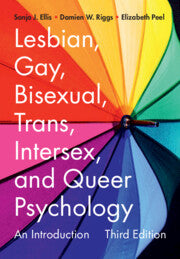Lesbian, Gay, Bisexual, Trans, Intersex, and Queer Psychology
An Introduction
Author(s): Sonja J. Ellis, Damien W. Riggs, Elizabeth Peel
Couldn't load pickup availability
🚚 Please note we can only ship within the UK.
FREE delivery on books (excluding sale).
Delivery for other items is £1.50 - £4.50, calculated at checkout.
T&Cs apply.
Free click & collect on all orders.
The third edition of this award-winning textbook provides an accessible and engaging introduction to the field of LGBTIQ+ psychology. Comprehensive in scope and international in outlook, it offers an integrated overview of key topical areas, from history and context, identities and fluidity, families and relationships, to health and wellbeing. This third edition includes updates across all chapters that provide a greater focus on diversity and utilize new terminology throughout to reflect changes in the field. It addresses recent developments in the field of trans studies, and explicitly references emerging work around pansexuality and asexuality. An entirely new chapter focuses on a diversity of topics receiving increased attention including LGBTIQ+ people in foster care, LGBTIQ+ refugees, disabled people accessing services, and trans and intersex people in sport. The fallout of increasing far-right extremism in Europe and America is also discussed. This groundbreaking textbook is an essential resource for undergraduate courses on sex, gender and sexuality in psychology and related disciplines, such as sociology, health studies, social work, education and counselling.
- Reflects the current state of the field through an integrated overview of key topical areas
- New edition offers a greater focus on diversity, including developments surrounding trans people, pansexuality and asexuality, as well as updated terminology throughout
- A new chapter covers trans and intersex people in sport, LGBTIQ+ people in foster care, LGBTIQ+ refugees, and disabled people accessing services
- Feature boxes provide concise overviews of key research areas and offer first-person narratives that bring topics to life
- Other pedagogical features to support learning and to facilitate discussion and reflection include end-of-chapter questions and classroom exercises, further reading suggestions, and a comprehensive glossary
Share


